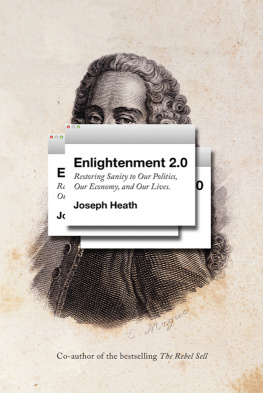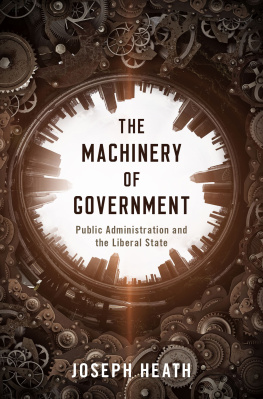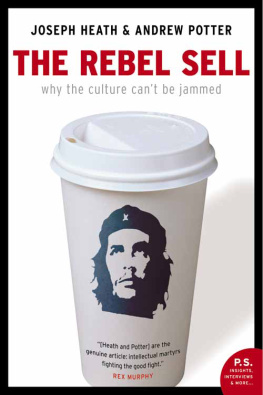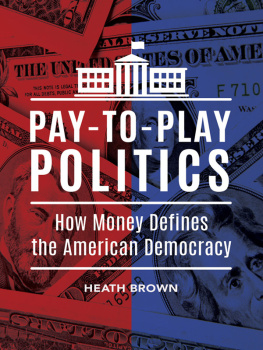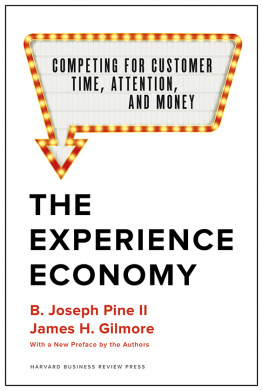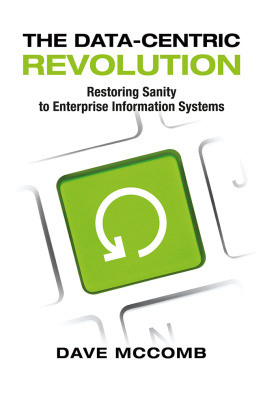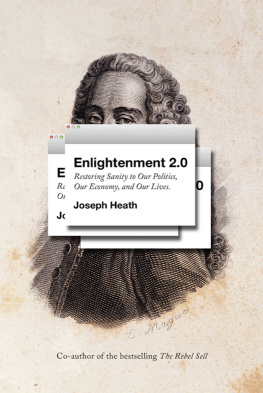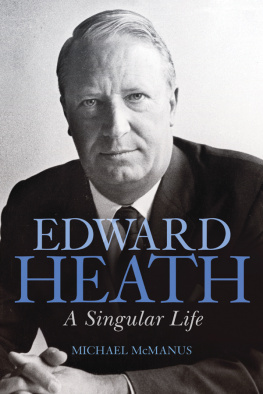Joseph Heath - Enlightenment 2.0 : restoring sanity to our politics, our economy, and our lives
Here you can read online Joseph Heath - Enlightenment 2.0 : restoring sanity to our politics, our economy, and our lives full text of the book (entire story) in english for free. Download pdf and epub, get meaning, cover and reviews about this ebook. year: 2014, publisher: HarperCollins, genre: Politics. Description of the work, (preface) as well as reviews are available. Best literature library LitArk.com created for fans of good reading and offers a wide selection of genres:
Romance novel
Science fiction
Adventure
Detective
Science
History
Home and family
Prose
Art
Politics
Computer
Non-fiction
Religion
Business
Children
Humor
Choose a favorite category and find really read worthwhile books. Enjoy immersion in the world of imagination, feel the emotions of the characters or learn something new for yourself, make an fascinating discovery.
- Book:Enlightenment 2.0 : restoring sanity to our politics, our economy, and our lives
- Author:
- Publisher:HarperCollins
- Genre:
- Year:2014
- Rating:4 / 5
- Favourites:Add to favourites
- Your mark:
- 80
- 1
- 2
- 3
- 4
- 5
Enlightenment 2.0 : restoring sanity to our politics, our economy, and our lives: summary, description and annotation
We offer to read an annotation, description, summary or preface (depends on what the author of the book "Enlightenment 2.0 : restoring sanity to our politics, our economy, and our lives" wrote himself). If you haven't found the necessary information about the book — write in the comments, we will try to find it.
Enlightenment 2.0 : restoring sanity to our politics, our economy, and our lives — read online for free the complete book (whole text) full work
Below is the text of the book, divided by pages. System saving the place of the last page read, allows you to conveniently read the book "Enlightenment 2.0 : restoring sanity to our politics, our economy, and our lives" online for free, without having to search again every time where you left off. Put a bookmark, and you can go to the page where you finished reading at any time.
Font size:
Interval:
Bookmark:
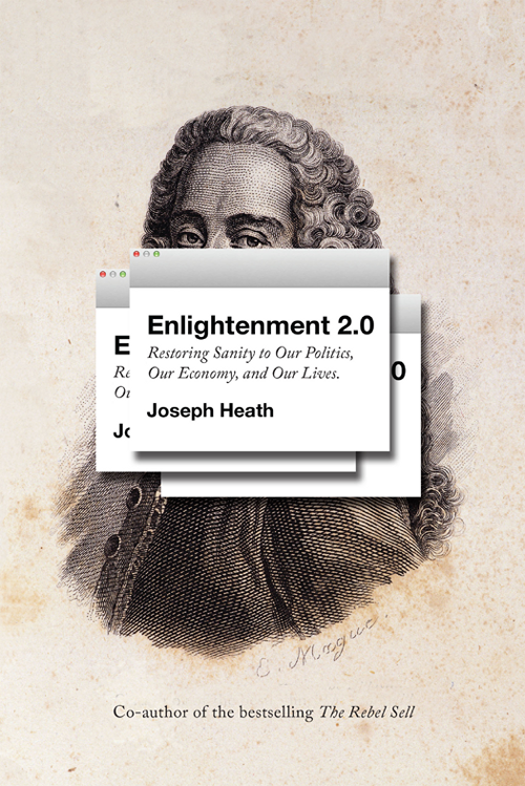
Restoring sanity
to our politics,
our economy,
and our lives
Joseph Heath

For Andrew
The National Mall in Washington, D.C., is one of the worlds great boulevards. Officially designated a national park, its tree-lined expanse runs from the Lincoln Memorial in the west to the Capitol in the east, punctuated by the Washington Monument almost square in the middle. It provides a grand setting for Americas great national institutions, museums, and memorials, and it is where over 24 million tourists come every year to bask in the glory that is the United States of America.
It is also where a great many Americans come to complain about their government.
There have been thousands of rallies, great and small, over the years, but in October 2010, the National Mall was the scene of perhaps its most peculiar event to date. On the day before Halloween, close to a quarter million Americans gathered, not for civil liberty or equal rights, and not to oppose the war or support the troops. Instead, they rallied for sanity.
Led by Jon Stewart, host of the satirical news program The Daily Show, the rally was intended as a call for more reasoned discussion in American politics, outside the cacophony of partisan extremism that dominates Americas news media. And while Stewart insisted that the rally was not a partisan event, it was widely interpreted as a response to the Reclaiming quickly turned into a mass protest against the extreme craziness that had erupted on the American political scene after the election of Barack Obama.
It was the first time, perhaps since the French Revolution, that reason had become the object of large-scale political mobilization in the West. This says a lot about the changes that have occurred in American political culture in the past few decades.
The big tent of the American right has always sheltered its share of crazies, particularly gun nuts and religious conservatives, but in recent years they have been joined by the anti-tax Tea Party movement, the birthers (who deny that Obama was born in the United States), the truthers (who believe that the collapse of the World Trade Center towers was an inside job), and a dogs breakfast of antiscience denialists who believe in neither evolution nor global warming and who are highly suspicious of much else besides. There came a point, however, when the sideshow began to take over center stage. Americans woke up to find that their political system was increasingly divided, not between right and left, but between crazy and non-crazy. And whats more, the crazies seemed be gaining the upper hand.
Consider the case of Glenn Beck, who is a conspiracy theorist in the classic mold. Before he finally lost his TV show on Fox News, Beck used to draw elaborate diagrams on a chalkboard, sketching out the connections he saw between various people and trends, all part of a vast secular socialist conspiracy aimed at robbing Americans of their birthright. It was all so stereotypicalas though someone had put in a request to central casting for a nut to do political commentary. Higher-ups at the network may have seen it as pure entertainment, but millions of Americans took it quite seriously.
Popular awareness that something was going quite wrong in America probably came in 2005. That was the year the comedian Stephen Colbert coined the term truthiness to describe the growing abuse of appeals to emotions
Since 2005, the syndrome that Colbert described has, if anything, become more virulent. The 2012 primaries for the Republican presidential nomination, for example, became almost otherworldly, the discussion and debate increasingly unhinged from reality. Rick Santorum, who was the only person able to mount a serious challenge against the eventual nominee, Mitt Romney, at one point made the following series of claims (against the specter of government rationing of health care):
In the Netherlands, people wear different bracelets if they are elderly. And the bracelet is: Do not euthanize me. Because they have voluntary euthanasia in the Netherlands, but half of the people who are euthanizedten percent of all deaths in the Netherlandshalf of those people are euthanized involuntarily at hospitals because they are older and sick. And so elderly people in the Netherlands dont go to the hospital. They go to another country, because they are afraid, because for budget purposes, they will not come out of that hospital if they go in there with sickness.
What is astonishing about this sequence of claims is that almost everything in it is falseand not just false, but fantastic, made-up, disconnected from reality. The only thing Santorum said that is true is that the Netherlands permits physician-assisted suicide. Needless to say, no one is subject to involuntary euthanasia (i.e., murder) in the heart of Europe.statistics are all false. The detail about the bracelets is completely imaginary. And there is no evidence of elderly Dutch people traveling to other countries for fear of being euthanized at their local hospital. It was as though Santorum were living in a parallel universe, where the facts were what he wanted them to be (and happened to support his paranoid, apocalyptic, ultra-rigid brand of Christianity).
Furthermore, he seemed not to realize that the Netherlands was a real place, where people might hear what he said and hope to set the record straight. The Dutch were actually quite upset about the lies that were being told about their country in America. Yet when pressed by a Dutch reporter to explain Santorums comments, his official spokespersonamazinglyrefused to retract or apologize for Santorums claims. She defended him on the grounds that Rick says whats in his heart.
Sometimes the jokes write themselves. In this case, it was as though the Santorum campaign got their talking points from Colbert. Their defense, in a nutshell, was that even though the candidates claims were not true, they were nevertheless truthy. Simply pointing this out was satisfactory, from their perspective; no apology or retraction was necessary.
The same year that Colbert coined the term truthiness, a short essay written by the philosopher Harry Frankfurt, entitled On Bullshit, became an international sensation. The essay was actually more than twenty years old and already widely known among academics. But when the press reissued it as a stand-alone volume, it clearly hit a nerve with the public, who propelled it onto the New York Times bestseller list for twenty-seven weeks. It was not so much that people enjoyed Frankfurts writingindeed, it is not clear how many people actually cared to read through and follow the argument. What mattered more was that Frankfurt had given a name to something that everyone had already noticed but didnt have a way of talking about. (As he put it in the opening lines, One of the most salient )
Frankfurts important contribution was to have distinguished between lying and bullshitting. What characterizes the bullshitter is that, unlike the liar, who at least maintains the pretense of telling the truth, the bullshitter has simply opted out of the truth-telling game. There is no pretense with the bullshitter. Although producing ordinary declarative sentences that would normally be evaluated under the categories of truth and falsity, the bullshitter is not even trying to say something that sounds true. (In a subsequent contribution to the genre, Laura Penny picked out the phrase your call is important to usrepeated ad nauseam to callers on holdas quintessential bullshit. Its not just unbelievable, its
Font size:
Interval:
Bookmark:
Similar books «Enlightenment 2.0 : restoring sanity to our politics, our economy, and our lives»
Look at similar books to Enlightenment 2.0 : restoring sanity to our politics, our economy, and our lives. We have selected literature similar in name and meaning in the hope of providing readers with more options to find new, interesting, not yet read works.
Discussion, reviews of the book Enlightenment 2.0 : restoring sanity to our politics, our economy, and our lives and just readers' own opinions. Leave your comments, write what you think about the work, its meaning or the main characters. Specify what exactly you liked and what you didn't like, and why you think so.

